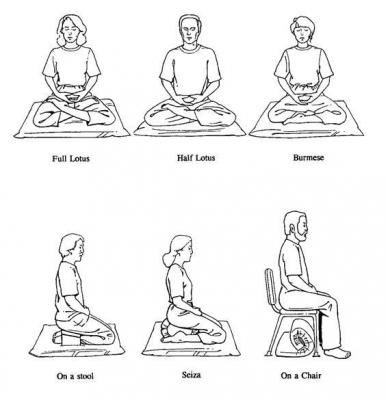
“Meditation is to the mind what aerobic exercise is to the body. Like exercise, there are many good ways to do it and you can find the one that suits you best.” – Rick Hanson.
In the last post we discussed some thoughts on various meditation positions to use in beginning meditation.
Today we will discuss what meditation technique you should use in starting out with practice. We’d appreciate hearing comments and suggestions from others. There are many paths!
“The best meditation of all is . . . the one you will do.” – Rick Hanson.
There are literally thousands of meditation techniques and it can be very confusing sorting out which are best for you. We recommend, though, that you start out with a very simple form of focused meditation; following the breath. Later we encourage you to explore some of the other forms of meditation to discover what works best for you and your particular goals. We’ll be discussing some of the other techniques in future posts.
Keep in mind that the most fundamental goal of meditation is to quiet the mind, to quiet the incessant internal voice that is constantly giving instructions, criticizing, planning, ruminating, and just simply jabbering in a repetitive and persistent fashion. The basic idea is to reduce this implicit speech, quieting the mind so that everything else that is here in the present moment becomes much more aware.
Following the breath is a great way to begin. It is simple, yet it can be very effective. The mind is always looking for something to do. Following the breath gives it something to do and can thus be of great assistance in quieting the mind. Later, you should begin to withdraw from giving the mind even this simple task to do as doing this tends to reinforce the mind’s belief that it can control everything and the implicit speech that is doing the counting. But, for now, we can use it against itself.
The breath is always there. So it can be used as a meditative anchor regardless of what else may be going on, where you are, or the state of your body. It is obvious and thus doesn’t take any special ability to notice and follow it. Even when you’re a very advanced meditator starting a meditation following the breath is helpful in centering and moving into another form of meditation or when concentration drifts, as it inevitably will, the breath provides a wonderful reentry point to transition back to the current meditation.
To begin a focused breath meditation, sit in your preferred posture, in a quiet place, and close your eyes and relax. Let your breathing be natural. Do not try to control it. Your task will be simply to watch it. Every time you breathe in or breathe out count, starting at one and continuing up to ten. Breathe in count “one”, breathe out count “two”, breathe in count “three”, breathe out count “four”, etc. until you get to “ten” then return to “one and begin again. That’s all you do. It’s that simple.
As you continue this simple task, your experience will be a revelation! You will inevitably find that very quickly your mind drifts away from counting the breaths and engages in all kinds of thoughts, perhaps plans for the future of reviewing the past or in response to some event in the immediate environment. Regardless, you mind drifts away from its designated task. When that happens, as it often will, and you recognize that your mind has drifted off, simply return to counting the breaths, either picking up where you left off or starting again at “one”.
It is important that you don’t feel recriminations for going off task. Don’t beat yourself up about it. Understand that this is normal and happens to everyone, even experienced meditators. Instead, congratulate yourself on detecting it and return to you object of focus, the breath. Gently go back to counting the breath, feeling good that you’re returning.
Don’t be surprised if you lose concentration before you can even get to finish the first ten. Don’t be surprised if this happens over and over again. It will and it will for many meditations to come. Just know that this is the natural course of meditation and is perfectly normal.
Continue the meditation, following the breath, drifting off, going back to the breath, drifting off, going back to the breath etc. until the allotted time is over.
Following the meditation it is useful not to immediately get up and resume your day but to spend a few minutes reflecting upon what you have just experienced. There is a tremendous insight just waiting to be noticed; you cannot control your mind. Given the task to control your mind performing a very simple task over a very brief period of time, you find that it is almost impossible to do. Reflect on this fact. It is very important and the beginning of the wisdom that emerges from meditation.
In the next post, we’ll discuss the next steps in developing your meditation.
CMCS








